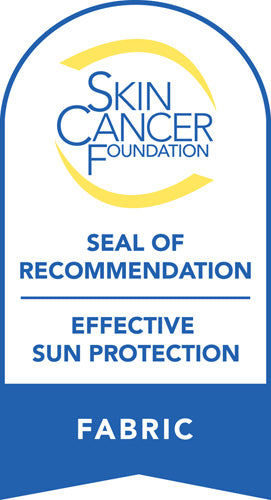What It Takes an Apparel Company to Get Approved by the Skin Cancer Foundation
Did you know that 9,500 people in the US alone get diagnosed with skin cancer every day?
We all know that wearing sunblock can help reduce the risks of skin cancer, but it isn't enough. Staying out of the sun every day is impractical for most people.
To protect yourself against the sun, you need to wear the proper sun protective clothing. Unfortunately, not all clothes provide enough UV protection. The key is checking which ones have the approval of the Skin Cancer Foundation.
The Skin Cancer Foundation certifies every product that comes its way for UV efficacy. When you see the SCF seal of recommendation on apparel, you can rest assured it's up to the task.
So, what do you need to do to get the seal of recommendation? Read on to learn what to do to get approved by Skin Cancer Foundation and what it means for consumers.
Getting the Skin Cancer Foundation's Seal of Recommendation
The Skin Cancer Foundation (SCF) is a global organization focused on raising awareness about skin cancer. They also educate people about the illness and its prevention. To combat cancer, the foundation tests different products for their sun-protection effectiveness.
The SCF tests products and grants them a seal of recommendation if proven safe and effective. Skin cancer is the most common type of cancer, and studies show that 1 in 5 people can get it. This is why the Skin Cancer Foundation takes its mission seriously.
To get a seal of recommendation, a product must meet a minimum UPF of 30. We'll go into UPF later, but you can consider it SPF for clothes. The higher the number, the better the apparel keeps UV rays from reaching you.
The Requirements Every Company Needs to Pass
Getting a product approved is tricky. The first requirement is self-testing. Companies that want the seal must submit an application with supportive data.
There is no way to test UPF at home. So, if you want to know your apparel's UPF rating, going through the SCF is non-negotiable.
These companies must join the SCF's Corporate Council to submit an application. Made up of over 100 companies, the Council shares a commitment to products that meet rigorous testing standards. After paying the yearly membership fee of $10,000, a company can proceed.
As a member of the Council, any company can submit product UV data for review. It's expected that brands provide UV testing results for all fabrics used by a brand. Volunteers from the Photobiology Committee will review each submission and determine its effectiveness. The Photobiology Committee consists of top scientists and researchers in their field.
This lends the SCF a ton of legitimacy, making the results trustworthy for consumers. Also, the foundation only grants the seal of recommendation to the fabrics, not the brand. This means that each company needs to test, submit, and have each fabric retested in this way if they want them all to have the seal.
This goes a long way in assuring consumers and protecting them from false claims.
What Is UPF?
When it comes to sun protection products, the first thing that may come to mind is SPF. Although used to determine sun-protection effectiveness, this only applies to sunblock lotion. To measure the effectiveness of UV-protected clothing, manufacturers use UPF.
The ultraviolet protection factor, or UPF, determines the amount of UV radiation that reaches your skin through a fabric. Note that there are different levels of UPF to use in products. For instance, a UPF 50 fabric allows 2% UV ray penetration and blocks 98%.
According to the Skin Cancer Foundation requirements, a fabric must have UPF 30. If your product achieves this number, it only allows 3% of the sun to reach your skin. However, a higher UPF measurement guarantees more protection.
What UPF Rating Do You Need?
Like SPF in sunscreens, the higher UPF numbers on clothing equates to more protection. As mentioned, the UPF tells you the amount of UVA and UVB that can pass through the fabric.
The American Society for Testing and Materials created a standard for sun-protection effectiveness. In this measurement scale, there are three levels you need to pass.
The first level of UPF ranges from 15 to 24, indicating a good amount of protection. However, this rating will not be enough to get the seal of approval from the Skin Cancer Foundation. The UPF ranging from 25 to 39 is the second level, providing an ideal amount of sun protection.
For better protection, the UPF of your apparel must range from 40 to 50 or more. Although it can cost more, a higher UPF guarantees more UV-ray protection.
What Impacts UPF?
The fabric color can affect the amount of sunlight reaching your skin. Lighter shades and more sheer fabrics will almost always have lower UPF values. It's possible to treat apparel with UV-Ray clothing protection, but don't expect miracles.
Dark-colored clothing absorbs light better, giving it sufficient UPF. UPF isn't about reflection but about stopping harmful UV rays from touching your skin. Clothes with stronger hues, like red or navy blue, will also have better UPF.
Another crucial factor is the construction of the fabric. We mentioned that sheer fabrics are bad for UPF. This is because they allow more sunlight, and thus UV, to pass through.
For a product to have a good UPF, such as above 30, the fabric weave should be dense or compact. Denim, wool, and canvas are all excellent examples.
What A Product Approved by Skin Cancer Foundation Means for Consumers
When you see a product approved by Skin Cancer Foundation, you can rest easy. The SCF has rigorous standards for testing and won't let low UPF clothing pass. Thanks to their hard work and high ethics, seeing the SCF seal of recommendation increases consumer confidence.
If you're looking for a place to find high-quality 50+ UPF apparel, we also have you covered. At Bloq UV, we take sun protection seriously and stand by our products. Contact us today and get free shipping for orders over $100!



